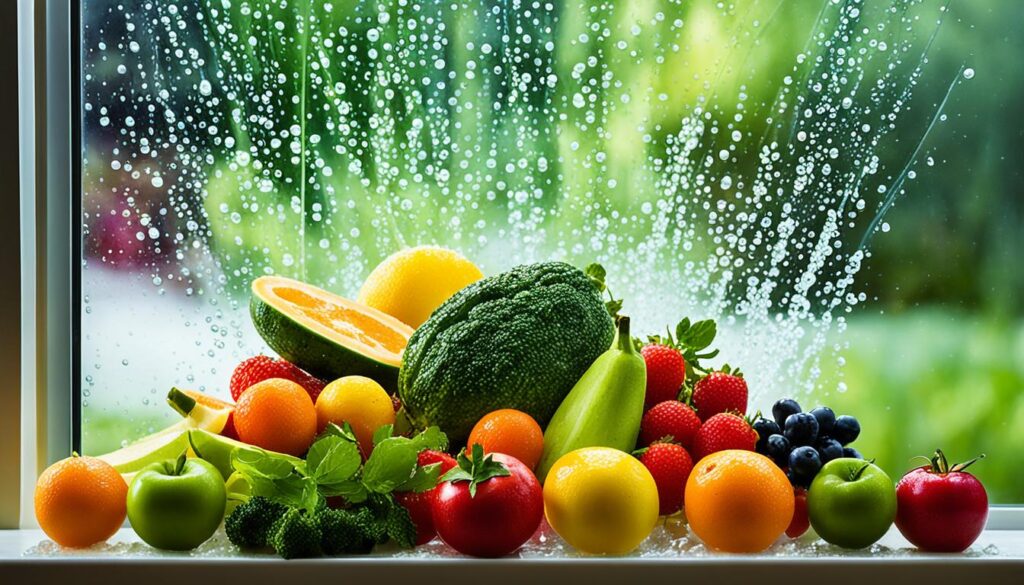Water fasting has become popular for losing weight and boosting health. It means drinking only water for 24 to 72 hours. This method can help with autophagy, lower disease risk, and improve hormone sensitivity. But, it’s important to be careful and know what you’re doing.
Before starting a water fast, ease into it by eating less and pick a good fast length. You might feel tired, dizzy, weak, or nauseous during the fast. Drinking 2-3 liters of water a day, especially mineralized water, keeps you hydrated and supports your body.
When you break your fast, slowly start eating again with foods that are easy to digest and full of nutrients. This helps your body adjust and avoids problems like refeeding syndrome. Water fasting isn’t right for everyone. Some people should not fast or should only fast with a doctor’s watchful eye.
Key Takeaways
- Water fasting involves consuming only water for 24-72 hours and may offer health benefits such as promoting autophagy and lowering the risk of chronic diseases.
- Preparing your body by reducing portion sizes and choosing an appropriate fasting duration is essential for a successful water fast.
- During a water fast, stay hydrated by drinking 2-3 liters of mineralized water daily to support your body’s functions.
- Breaking a fast requires a gradual reintroduction of easily digestible, nutrient-dense foods to avoid complications like refeeding syndrome.
- Water fasting is not suitable for everyone, and certain individuals should avoid fasting or only do so under medical supervision.
Understanding Water Fasting and Its Benefits
Water fasting is becoming more popular as a way to improve health and live longer. It means not eating or drinking anything except water for a while. Most people fast for 24 to 72 hours. Some even fast for several days, but it’s important to know the good and bad sides of it.
What is Water Fasting?
Water fasting means you only drink water and no food for a certain time. This time can be from 24 hours to a few days. It’s key to drink enough water to stay healthy and avoid bad effects. Experts say to drink at least 40 ounces of water a day while fasting.
Potential Health Benefits of Water Fasting
Water fasting can bring many health benefits, such as:
- Promoting autophagy: This process from fasting might slow aging and help prevent diseases like neurodegenerative disorders and metabolic diseases.
- Improving insulin sensitivity: Fasting for three days or more can lower insulin levels by 30%, which helps with insulin sensitivity.
- Enhancing leptin sensitivity: Water fasting may make leptin, a hormone that controls hunger and metabolism, more effective.
- Reducing chronic disease risk: It can lower inflammation in the body, which can reduce the risk of chronic diseases.
- Lowering blood pressure: Most people with high blood pressure saw their blood pressure go back to normal after a water fast.
- Supporting heart health: Fasting can improve cholesterol levels by lowering bad cholesterol and raising good cholesterol.
A study in 2023 found that fasting for five to 20 days can lower blood sugar and insulin levels, and improve insulin resistance. Also, an eight-day water fast helped middle-aged men lose an average of 13 pounds.
Who Should Avoid Water Fasting?
Not everyone should try water fasting. Some groups should avoid it:
- Children and teenagers
- Pregnant or breastfeeding individuals
- People with certain health issues like gout, diabetes, or kidney diseases
- Adults over 75 years old
- Those with a history of eating disorders
Always talk to a doctor before starting a water fast, especially if you have health issues. Fasting for more than seven days needs close medical watch.
Preparing Your Body for a Water Fast
Before starting a water fast, it’s key to get your body ready for not eating. Getting ready can lessen side effects and make fasting smoother. By eating less and picking the right fasting time, you’re setting up for a good water fast.

Reducing Portion Sizes Before the Fast
If you’re new to water fasting, start by preparing your body for 3-4 days without food. You can do this by eating less at each meal. This helps your body get used to eating less and can lessen hunger during the fast.
Another way to prepare is by doing intermittent fasting. This means you only eat during certain hours. For instance, you might eat for 8 hours and fast for 16. This helps your body get used to not eating for long periods, making the water fast easier.
Choosing the Right Duration for Your Water Fast
Choosing how long to fast is important and depends on your health and goals. Most water fasts last 24 to 72 hours. This lets your body start using fat for energy and enter a state called ketosis.
| Fasting Duration | Considerations |
|---|---|
| 24 hours | Suitable for beginners, minimal side effects |
| 48 hours | Deeper ketosis, potential for greater benefits |
| 72 hours | Advanced fasting, requires experience and preparation |
| Beyond 72 hours | Should only be done under medical supervision |
Fast longer than 72 hours should be done with a doctor’s help because of health risks. These long fasts can cause problems like not having enough electrolytes, dehydration, and others that need a doctor’s watch.
Always listen to your body during a water fast. If you feel very bad, dizzy, or have other worrying signs, stop your fast and get medical help if needed.
By getting ready with portion control and choosing the right fasting time, you can make your water fasting better and safer. Remember, fasting affects people differently, so be careful and pay attention to how you feel.
What to Expect During a 24-72 Hour Water Fast
Starting a water fast can change your health for the better. When you fast for 24-72 hours, your body changes a lot. It gets used to not eating. Knowing the side effects and symptoms is key.
Common Symptoms and Side Effects
When you don’t eat during a fast, you might feel some side effects. These effects are usually mild and will go away as you get used to fasting. Some common symptoms include:
- Headaches
- Dizziness
- Fatigue
- Nausea
- Irritability
- Difficulty concentrating
Listen to your body while fasting. If you feel very bad or get worse, stop fasting and talk to a doctor.
Staying Hydrated During the Fast
Drinking enough water is very important when you fast. Your body uses only water to work right when you’re not eating. Not drinking enough water can cause serious problems. Here’s how to stay hydrated:
- Drink 2-3 liters of water each day, spread out.
- Add a little Himalayan salt or sea salt to your water to help with electrolytes.
- Avoid drinks with caffeine because they can make you dehydrated.
- Check your pee color; it should be light yellow, which means you’re drinking enough water.
Drinking plenty of water during your fast helps prevent dehydration. It also helps your body clean itself.
If you feel very bad or don’t feel right during your fast, stop it and get medical help.
| Fasting Duration | Potential Side Effects | Hydration Guidelines |
|---|---|---|
| 24 Hours | Mild headaches, fatigue | 2 liters of water per day |
| 48 Hours | Dizziness, nausea, irritability | 2-3 liters of water per day |
| 72 Hours | Increased fatigue, difficulty concentrating | 3 liters of water per day, add electrolytes |
Knowing about the side effects and staying hydrated makes fasting easier. This way, you can enjoy the many benefits it offers.
Breaking a Fast with the Water Diet: What You Need to Know
After a water fast, it’s key to eat right to avoid stomach issues and help your body recover. Start with foods that are easy to digest and packed with nutrients. This helps your body adjust to eating again smoothly.

The Importance of a Gradual Reintroduction of Food
When you start eating again after a fast, do it slowly. Eating too much too soon can upset your stomach and lead to serious health problems like refeeding syndrome. This happens when your body can’t handle the sudden change in fluids and electrolytes, which is dangerous.
Start with small amounts of food and slowly increase your intake over a few days. Pay attention to how your body feels. Don’t rush to eat a lot, even if you’re really hungry.
Best Foods to Break Your Fast
Choose foods that are easy on your stomach and full of nutrients when breaking your fast. Good options include:
- Smoothies made with leafy greens, berries, and plant-based milk
- Vegetable soups or broths
- Cooked vegetables, such as steamed broccoli or roasted sweet potatoes
- Fermented foods, like sauerkraut or kimchi, to support gut health
- Healthy fats, such as avocados or poached eggs
Stay away from foods high in sugar, processed carbs, or unhealthy fats. These can be hard to digest and might undo the good from your fast. Go for whole foods that have protein, healthy fats, and complex carbs to help your body heal.
| Foods to Enjoy | Foods to Avoid |
|---|---|
| Smoothies with leafy greens and berries | Processed snacks and junk food |
| Vegetable soups and broths | High-sugar fruits and juices |
| Steamed or roasted vegetables | Fried or greasy foods |
| Fermented foods (sauerkraut, kimchi) | Alcohol and sugary beverages |
| Healthy fats (avocados, eggs) | Large, heavy meals |
Focus on eating foods that are easy to digest and full of nutrients after a fast. Be patient and slowly add solid foods back into your diet. This helps you recover well and keeps the good effects of your water fast.
Potential Risks and Dangers of Water Fasting
Water fasting is popular for its health benefits, but it’s important to know the risks. A study showed that 90 percent of people with high blood pressure lowered their blood pressure after a 10 to 11-day fast. Still, it’s best to start with caution and get advice from a doctor.
Dehydration and Electrolyte Imbalances
Water fasting can lead to dehydration and electrolyte imbalances. These imbalances can cause dizziness, muscle cramps, and more. In severe cases, it can affect the heart rhythm and even cause cardiac arrest.
To avoid dehydration and electrolyte imbalances, drink plenty of water during a fast. You might also need to take electrolyte supplements with a doctor’s advice. But remember, even with precautions, fasting can still have risks.
Refeeding Syndrome: A Serious Concern
Refeeding syndrome is a big risk when you start eating again after fasting. It can cause serious problems like heart failure and brain issues. This happens when your body can’t handle the sudden change in food intake.
Refeeding syndrome is especially dangerous for those who have fasted for a long time or have health issues like eating disorders. It’s important to start eating again slowly and with a doctor’s help to avoid this.
Water fasting can also cause other problems, including:
- Muscle loss: Your body might break down muscle for energy, making you weak.
- Orthostatic hypotension: Your blood pressure might drop when you stand, making you dizzy.
- Worsening of certain medical conditions: It can make conditions like gout and heartburn worse.
| Risk Group | Reason for Avoiding Water Fasting |
|---|---|
| People under 18 or over 65 | Increased risk of complications and nutrient deficiencies |
| Pregnant or breastfeeding individuals | Potential harm to fetal development and milk production |
| People with type 1 diabetes | Risk of hypoglycemia and other complications |
| Individuals with eating disorders | May worsen disordered eating behaviors and psychological distress |
“Water fasting can be dangerous, especially for people with certain medical conditions or those in high-risk groups. It’s essential to consult with a healthcare professional before attempting any form of fasting to ensure safety and minimize potential complications.”
While water fasting may have benefits, it’s crucial to talk to a healthcare provider before starting. Knowing the risks and taking steps to stay safe can help you decide if it’s right for you.
Incorporating Water Fasting into a Healthy Lifestyle
Water fasting may have some health perks, but it’s not a good long-term plan for staying healthy or losing weight. To really boost your health, focus on eating well, exercising regularly, and eating mindfully every day.
If you’re curious about fasting, try intermittent fasting instead of water fasting. This method means eating and fasting at different times. For example, the 16/8 method means fasting for 16 hours and eating during the other 8 hours.
Intermittent Fasting as a Sustainable Alternative
Intermittent fasting can be good for your health, like water fasting but safer. It may help with:
- Managing blood sugar and lowering type 2 diabetes risk
- Reducing inflammation and lowering C-reactive protein levels
- Lowering cholesterol, blood pressure, and triglycerides, which can cut heart disease risk
- Improving brain function and protecting against Alzheimer’s and Parkinson’s
- Helping with weight loss more than just cutting calories
- Boosting human growth hormone for metabolism, weight loss, and muscle strength
| Fasting Method | Description | Potential Benefits |
|---|---|---|
| Water Fasting | Drinking only water for a set time, usually 24-72 hours | Weight loss, autophagy, reduced inflammation |
| Intermittent Fasting (16/8) | Fasting for 16 hours and eating in an 8-hour window daily | Fat loss, muscle retention, better insulin sensitivity |
| Alternate-Day Fasting | Switching between fasting days and normal eating days | Lower cholesterol, blood pressure, weight loss |
| 5:2 Diet | Eating normally for 5 days and eating very little on 2 days a week | Weight loss, better brain function, less inflammation |
Intermittent fasting might be easier to stick with than water fasting. But, always talk to a doctor before starting any new diet. They can help make sure it’s right for you and guide you safely. This way, you can keep eating well and exercising to stay healthy and happy.
Conclusion
Water fasting is a practice that has caught people’s attention for its health benefits. These benefits include weight loss, better insulin sensitivity, and a lower risk of chronic diseases. But, it’s important to be careful and think about your own health before trying it.
Before starting a water fast, make sure to take the right steps and get advice from a professional. Start by eating less and stay hydrated during the fast. When you break your fast, eat foods that are easy to digest. Remember, water fasting might not be good for everyone, especially kids, pregnant or breastfeeding women, people with certain health issues, or those with eating disorders.
If you’re thinking about fasting, you might want to try intermittent fasting instead. This means eating only during certain times, like the 16/8 method or the 5:2 diet. By eating well during your eating times and exercising regularly, you can improve your health and well-being. This way, you avoid the risks of long-term water fasting.




